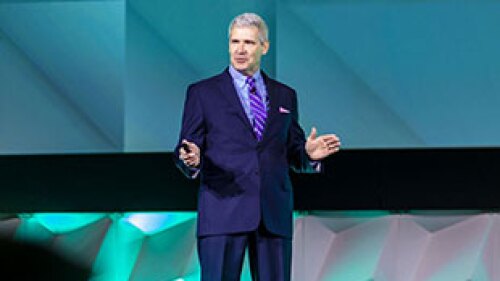- Regardless of who wins presidency, U.S. will have divided Congress next year.
- Need for compromise to resolve “fiscal cliff.”
- Media is fixated on trivial miscues, not substantial issues.
Democratic presidential campaign senior advisor Robert Gibbs and Republican Party strategist Karl Rove traded quips and barbs in a spirited debate that closed ULI’s 2012 Fall Meeting in Denver. With Gibbs praising the president’s efforts to restore economic stability to the U.S., and Rove criticizing President Obama for not accomplishing enough, the two political insiders disagreed on virtually every aspect of President Obama’s track record over the past four years.
While both expressed confidence that their favorite presidential candidate would win the November 6 election, both admitted that whether the winner is President Obama or GOP presidential nominee Mitt Romney, he will very likely face a divided Congress, with the Democrats retaining control of the Senate and the Republicans remaining the majority party in the House of Representatives. This scenario—in place over the past two years of the Obama administration – has produced few instances of compromise. However, despite much finger pointing by Gibbs and Rove over which party has caused gridlock, the two political opposites did find some common ground.
One area of agreement: the need for the executive and legislative branches to compromise and cooperate – quickly. Both Gibbs and Rove stressed that it will be imperative for the next president and both houses to work together to keep the nation from lapsing into another recession. With the fiscal cliff looming in mid-January 2013, which includes the expiration of hundreds of millions of dollars in tax cuts as well as spending cuts in domestic programs, they said the president and the new Congress will be compelled to collaborate on federal debt and deficit reduction measures. “We’ve kicked this can so far down the road that we have run out of road,” Gibbs said. “Both sides will realize they are stuck with each other and they have got to make something work.”
Another area of agreement: The media’s fixation on trivial rather than substantive issues in presidential campaign coverage, which can result in voters approaching election day ill- informed and basing choices more on emotion than knowledge. The constant polling, the quest for “gotcha” moments “drives candidates to do things that get attention, rather than focus on what really matters,” Rove said.
Still, both Gibbs and Rove said there is value in using “lighter venues” such as appearances on “The Daily Show” and “The View” to show a candidate’s softer side – particularly important for Obama and Romney, who have both been perceived at times as being cool and detached. “It’s fine to go places to show the warm side of their personalities, as long as it’s not a substitute for serious media,” Rove said.



